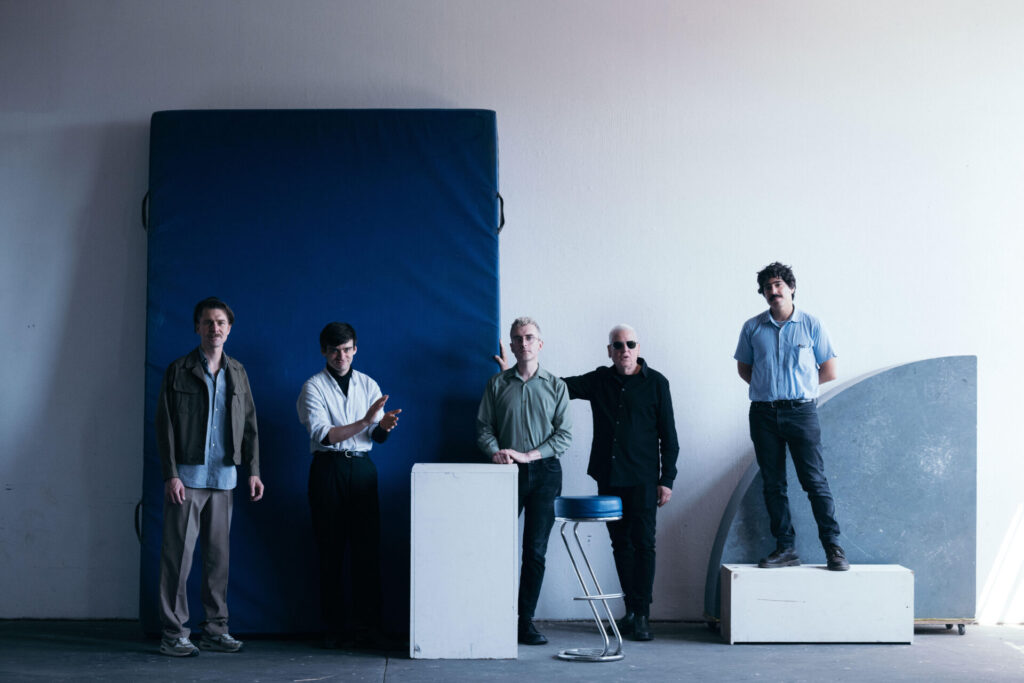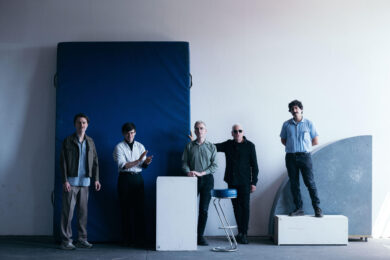Can you call it a resurgence when it keeps happening over and over again? Every decade or so, seemingly like clockwork, Arnold Dreyblatt comes into contact with a new group of just slightly left-of-the-dial indie rockers who help transmit his deeply infectious strain of minimalist composition to new audiences. It first happened in the 90s, with people like Jim O’Rourke (who has repeatedly said, in his typical self-deprecating manner, that it’s his fault indie bands became interested in minimalism). Then it happened again in the 2010s, when Dreyblatt made perhaps his unlikeliest team-up yet, recording an album with the indie folk band Megafaun that sounded like Appalachian fife-and-drum music pushed into its most trance-inducing zone.
How does Dreyblatt continually find ways to adapt his sound to work with new generations of musicians, many of whom come from radically different backgrounds? The easiest answer would be his open-mindedness, which is certainly present and certainly a factor. But as admirable as it is when a musician eschews the curmudgeonly tendencies that often come from having built such a legacy of work, it doesn’t guarantee successful cross-generational collaboration (look at Brian Eno and Fred Again, for just one example). Dreyblatt has frequently spoken of a desire to live a life in the arts, and to me, that understanding of his work is the engine that keeps his music moving forward. His work is a living, breathing mechanism, always evolving but never casting anything aside to the past. Every collaboration provides new tools and a new perspective on this life in the arts, something that keeps even his most unexpected collaborations from feeling like a novelty.
Arnold Dreyblatt teaming up with Horse Lords is not one of those unexpected collaborations, however. For one, a few years ago the Baltimore avant-rock shredders expatriated in Berlin, where Dreyblatt has been based for decades now. On another level, the heavy rhythmic emphasis in Dreyblatt’s music has long aligned it with rock music, even without the direct overtures that colleagues such as Glenn Branca and Rhys Chatham were making in the 80s. Horse Lords, in comparison, make music that is heavily informed by minimalist and microtonal composition, but with the pyrotechnics turned up just enough that one could feasibly describe them as a kickass rock band. But perhaps the biggest thread connecting Dreyblatt and Horse Lords is their extreme sense of laser-precision when it comes to exploring their respective sounds. Dreyblatt’s usage of percussive strings is so direct and intentional that it feels as if Dreyblatt is always one with his instrument, and relatedly, when Horse Lords really get in the zone with their interweaving microtonal guitars, it feels as if they are breathing air from another planet. Neither artist ever seems to get too lost in the technical side of their work, but listening to their music it’s hard to think that they’ve ever played a mistaken note in their life.
Extended Field, the eighteenth volume in the RVNG label’s FRKWYS series of collaborative releases, finds Horse Lords completely locked into Dreyblatt’s compositional method, and vice-versa. There are plenty of moments in which one can hear elements of the sweaty math rock-inflected side of the band, but they’re always subtle, never in any danger of overwhelming the deep focus and tension of Dreyblatt’s string textures. But when things do kick into full gear, Dreyblatt is right there with them, matching them in focus and vigor. Whereas Dreyblatt came up as a composer studying with legendary figures such as Morton Feldman, Pauline Oliveros and Alvin Lucier and made a name for himself in the legendary Downtown NYC scene in the 80s, Horse Lords’ origins are in the equally fruitful but much more off-the-beaten-path Baltimore freak music scene. Yet Extended Field is as simpatico as an intergenerational collab can get, with Dreyblatt’s compositional method lending a sense of shape and form to the music that Horse Lords color in ever gracefully.
The very first sound heard on Extended Field is the familiar sound of Dreyblatt’s scratchy bowed bass, one which calls to mind both his fellow traveler Tony Conrad and the sounds of ethnographic recordings from labels such as Ocora and Folkways. This is then augmented by glistening, repetitive electronic textures that would not sound out of place on something on Spectrum Spools (which, relatedly, released one of bassist Max Eilbacher’s earliest solo albums), but is also well at home in Dreyblatt’s music. The music builds into a steady, stomping march, with the electronics continuously becoming more sharp and sinewy as the sounds progress.
The clear highlight of the record is the title track, which finds the band letting loose and, in contrast to the rest of the record, indulging in their sweatiest tendencies. The track emphasizes the originality and creativity of saxophonist Andrew Bernstein, who plays with a percussive sound that feels like it is every bit as much a part of the rhythm section as the drums and bass. Relatedly, the track is also a major showcase for percussionist Andrea Belfi, who filled in for the band’s regular drummer Sam Haberman at Dreyblatt’s suggestion but fits in perfectly. The depth and texture of Belfi’s drumwork is beautifully crisp, and the degree to which he keeps things in the pocket even as the rest of the band continually ratchets up the tension and energy is impressive, to say the least. The track definitely feels like a Horse Lords track first and foremost, but the scratchiness of Dreyblatt’s strings lend it a raw ferocity that pushes things into the stratosphere.
The third track finds the group engaging in a pure overtone study, with electronics providing a heavy drone that clouds the piece in a trancelike aura of mystery reminiscent of Dreyblatt’s work with sound artist Paul Panhuysen. Bernstein’s saxophone playing sounds like Dickie Landry slowed to a glacial speed, drawing out the texture in every note and providing a hypnotic contrast with Dreyblatt’s screeching strings. The track flows seamlessly into the final track ‘Impulse Array’, which feels like both a classic Dreyblatt march and a classic Horse Lords burner at once. The subtly wah-wah’d guitar from Owen Gardner gives the track a loose, jammy feel, despite being as tight and controlled as everything these musicians have ever created.
A large part of the appeal of previous releases in the FRKWYS series, such as Vol. 8 with Blues Control & Laraaji and Icon Give Thank with Sun Araw, M. Geddes Gengras and The Congos, came from the sense that one was listening to weirdos from wildly different contexts concocting something unpredictable from their strange encounters. Extended Field presents something different, capturing a rare moment in which utterly singular musical minds from two different eras manage to meet one another on the same sonic plane. It’s the musical equivalent of a total eclipse, both rare and a force of nature all at once.



